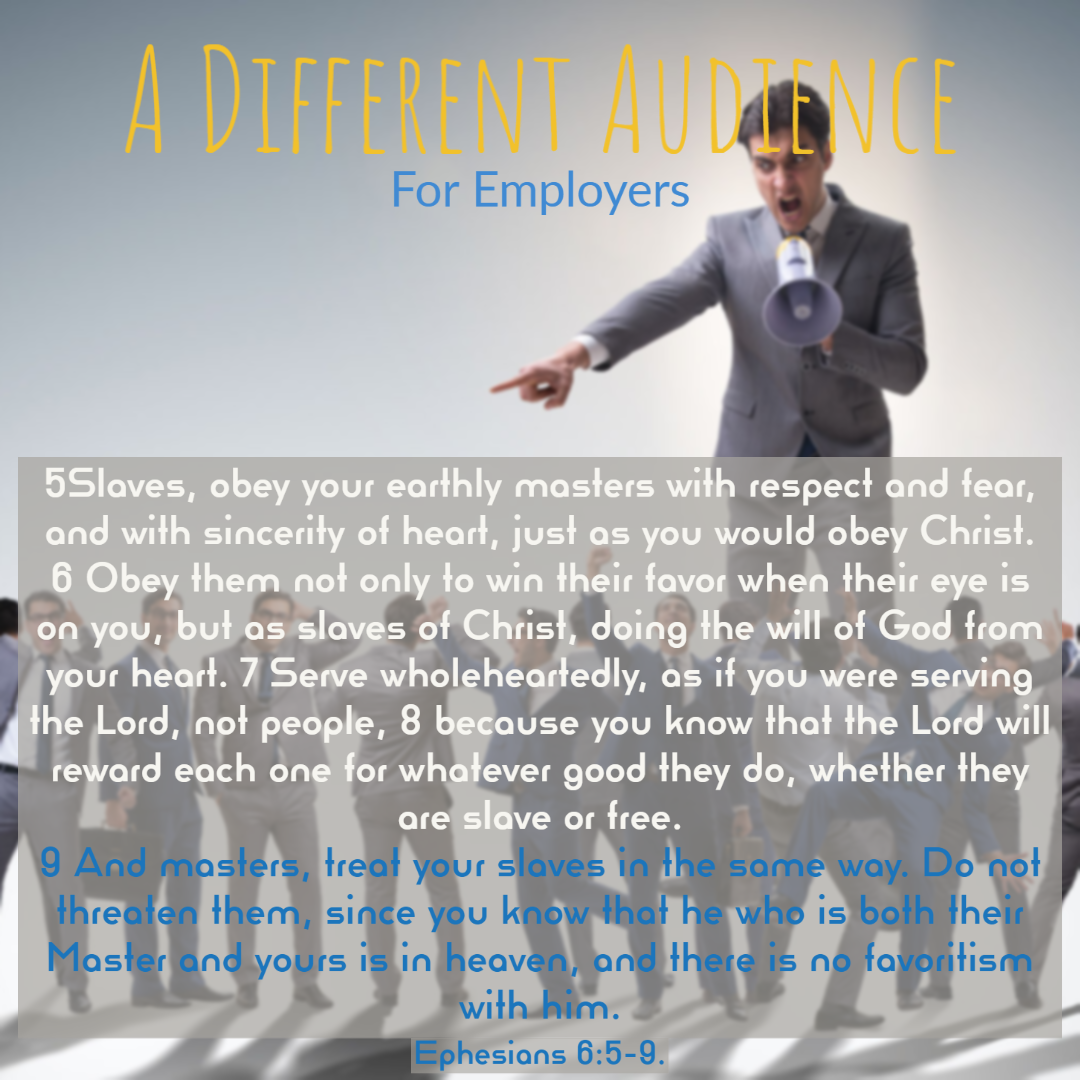
Who is watching you work? Whom are you working for? Whose opinion matters most in the end?
For the next two weeks, we're going to be looking at Ephesians 6:5-9. We're going to be taking Paul's teachings and applying it to both employees and employers today. This week we're going to focus on what this text means for the employees.
First, workers are told to be wholehearted in their work (see verse 5: "with sincerity of heart,"). Christians have a different motivation for their work -- they work as if they are serving the Lord (verse 5).
Second, Christians are to work with "sincerity of heart," meaning, singleness of heart. Christian work should be filled with focus and integrity.
Third, we are to work "not only to win their favor when their eye is on you." We should work hard even when you're not being watched and do more than just the bare minimum at our job.
Finally, verse 7 says "wholeheartedly" which means we are to work with cheerfulness and joy.
If you're a Christian, can you improve on any of these points in your work? If you're an employer, stay tuned next week as we discuss key points for you from Paul's teachings.

We're going to look at the same text this week as we did last week, Ephesians 6:5-9; however, this time we'll be discussing what the text means for employers. If you're an employee and you missed the post last week, make sure you go back and check it out!
Verse 9 specifically discusses employers or "masters". Let's break up the meaning of it below:
First, employers should not use guilt and coercion as a way to motivate their employees -- "do not threaten them". It should seem obvious, but a good employer should not use fear as the primary tactic to motivate their employees.
Second, employers should take up interest in the employees as people -- "treat your slaves in the same way." Invest in their whole lives, not just their productive work capacity.
Finally, Paul reminds the masters that God doesn't care about class distinction; therefore, it shouldn't make much of a difference to us either. Just because you're in a position of power, doesn't mean you can be condescending, demeaning, etc.
Employers and employees have something in common, they will all go before God in the end. If we're Christians, we should all be serving God regardless of if you are an employee ("slave" in this text) or an employer ("master" in this text).

For the last two weeks we've looked at a portion of Ephesians 6 discussing slaves/masters and what it means for Christian employees and employers. To wrap this section up, check out the picture for a good quote from the book.
Take some time this week to reflect on this quote and how you’re doing at your workplace.

Since January, we've been discussing why Christians are different because of their different virtues, view of humanity, source of wisdom, and audience. How do all of the above affect a Christian in the workforce? Here are just a few examples:
Christians should be known to not be ruthless. They should have a reputation of being fair, caring, willing to forgive, etc.
Christians should be known to be generous with their time, money, and resources.
Christians should be known to be calm and poised in the face of difficulty or failure. When we don't place our identity in our job, we don't have to panic when we face business failures or career reversal.
The final example is, Christians should not be seen as sectarian. This happens when we have an integrated and non-dualistic understanding of work. We can treat unbelievers well and understand that even though they don't share our beliefs, they can still do good work.
Check out a quote from the book in the graphic. Take some time to reflect on that over the next week.

The last couple of months, we've covered a lot about how Christians should be standing out in the workplace. Christians should be constantly looking at possibilities for their field of work to be more just and beneficial to more people. Even if you are working with integrity and there isn't anything inherently corrupt at your place of work, you should still be thinking about ways things can be improved to positively impact more people.
It can be easy to focus on your own job -- working with personal integrity, skill, and a joyful heart. However, as Christians we need to work on going beyond this. How can you take action to improve your field of work? This is a little easier when you've been in the field/business longer because you have more power and influence. Regardless of how long you've been working, you need to start thinking deeply about your kind of work now. What are some ways things can be improved in the industry to benefit more people? Do the deep thinking now so you can be ready to make the changes if and when the opportunity presents itself.
For SEM, we saw a need for the industry to help more people financial, regardless of their financial situation. We saw a need to help those with less money instead of just helping rich people get richer. We also started our Biblically Responsible Investing portfolios (Cornerstone Portfolios) and providing more faith-based resources because we wanted to integrate our faith into our work and be able to help others align their faith with their finances/investments.
You need to be preparing yourself now because you'll never know when God will give you opportunities to make big impacts.




